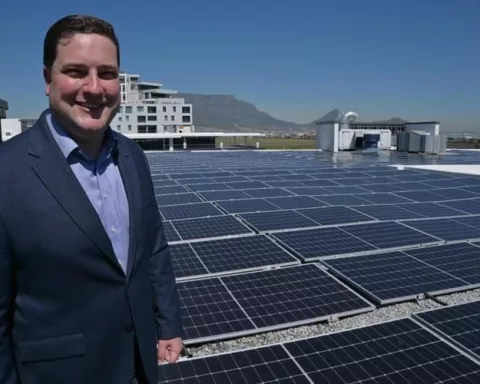Cape Town’s Cash for Power programme allows residents and businesses to sell surplus solar PV power to the city, earning a combination of bill credits and cash payouts. The programme has already facilitated the purchase of 25 million kilowatt-hours of solar power from micro-generators and aligns with the city’s objective to eliminate load-shedding. Mayor Hill-Lewis emphasises the importance of collective efforts in shifting towards a greener future and lauds the programme’s worth. The programme is expanding to include more residents and aims to diversify the city’s energy supply with independent power supply.
Shifting Towards a Greener Future
Cape Town’s Cash for Power programme allows the City to buy surplus solar PV power from micro-generators, rewarding them with a combination of municipal bill credits and cash payouts. The programme facilitated the city’s purchase of 25 million kilowatt-hours (kWh) of solar power from households and businesses, and it aligns with the city’s wider objective to gradually eliminate load-shedding. Mayor Hill-Lewis emphasized the critical role of local residents and businesses in this energy transformation, stating that their collective efforts as Team Cape Town can significantly contribute towards the end of load-shedding.
Since the onset of the 2022/23 financial year, Cape Town’s residential and business sectors have accrued more than R25.8m courtesy of the City’s unique Cash for Power programme. This unprecedented initiative allows the City to buy surplus solar PV power from micro-generators, rewarding them with a combination of municipal bill credits and cash payouts.
Mayor Geordin Hill-Lewis pointed out that critical policy modifications have now made it possible for power suppliers to not only earn credits on their comprehensive municipal bill, but also to gain cash for power injected back into the grid. This is a significant departure from the previous setup where suppliers could only balance their electricity bill to zero.
By the turn of 1 February 2024, there were a total of 1,461 suppliers, of which 869 were residential and 592 were commercial/industrial, who benefited from Cape Town’s Cash for Power scheme. This plan aligns with the city’s wider objective to gradually eliminate load-shedding.
Shifting Towards a Greener Future
Cape Town is spearheading the transition to a greener future by shifting its energy mix to a decentralized supply of reliable, cost-effective, and increasingly carbon-neutral energy. Mayor Hill-Lewis emphasised the critical role of local residents and businesses in this energy transformation, stating that their collective efforts as Team Cape Town can significantly contribute towards the end of load-shedding.
The Cash for Power programme facilitated the city’s purchase of 25 million kilowatt-hours (kWh) of solar power from households and businesses. In the fiscal year 2022/2023, Cape Town residents received payments exceeding R10,5 million for the power they produced. More than R8,8 million has already been paid in the current fiscal year. That adds up to R19,4 million spent solely on the feed-in tariff, with an additional R6,4m allocated for the 25c per kWh incentive to stimulate participation.
Mayor Hill-Lewis lauded the programme’s worth, remarking, “It’s some of the best money we’ve ever spent. We’re contributing vital kilowatts to our grid at a cost lower than Eskom’s supply, and returning money to the pockets of Capetonians.”
Expansion of the Cash for Power Programme
Businesses have been reaping the benefits of the Cash for Power initiative since June 2023, and the first enrolment window for residents to earn cash was recently opened. This next phase of the Cash for Power programme allows existing residential clients to apply to earn cash for power, where any leftover credit will accumulate until reaching a specific amount, which will then be paid out by the City.
In a wider effort to diversify the energy supply, Cape Town aims to incorporate up to one gigawatt of independent power supply to eliminate load-shedding, with the initial 650MW expected to be operational within five years. This capacity is sufficient to safeguard against four Eskom load-shedding stages by 2026.
Cape Town’s immediate load-shedding mitigation plan leading up to 2026 will primarily consist of a blend of Steenbras Hydro Plant (1 – 2 stages), 500MW of dispatchable energy (up to four stages from 06:00 – 22:00 daily where possible), and demand management programmes such as Power Heroes and Large Power Users (LPUs) curtailment.
Enabling a Sustainable Future
The Cash for Power applications are open to all residential customers on the home user tariff with an approved grid-tied SSEG system and a bi-directional AMI meter to feed power back into the grid. Once registered as a service provider on both the City Supplier Database and the National Treasury Web Based Central Supplier Database (CSD), interested parties can apply to sell their excess SSEG energy to the city.
Applications received after the first round closes on 8 March 2024 will be considered for the next round, with the date to be announced. As per Supply Chain rules, successful Cash for Power suppliers will enter a contract with the City for three years following their appointment.
Cape Town’s Cash for Power programme stands as a glowing exemplar of its energy strategy, demonstrating a commitment to a greener future and the democratisation of energy. It literally and metaphorically gives power back to the people, serving as a model for other cities.
Cape Town is leading the way in this energy revolution, showcasing what can be achieved when policy alterations are made with the welfare of the people and the environment in mind. It is a testament to the city’s dedication to cultivating a future that is not only sustainable but also participatory, where every resident or business, no matter their size, plays a role in powering the city.
What is Cape Town’s Cash for Power programme?
Cape Town’s Cash for Power programme allows residents and businesses to sell surplus solar PV power to the city, earning a combination of bill credits and cash payouts. The programme has already facilitated the purchase of 25 million kilowatt-hours of solar power from micro-generators and aligns with the city’s objective to eliminate load-shedding.
How does the Cash for Power programme benefit residents and businesses?
Through the Cash for Power programme, residential and business sectors have accrued more than R25.8m in bill credits and cash payouts. Residents who produce excess power can earn money back for their contributions to the city’s energy supply, while businesses can benefit from a more affordable and reliable energy source. The programme aligns with the city’s wider objective to gradually eliminate load-shedding.
How does the Cash for Power programme contribute to a greener future?
Cape Town’s Cash for Power programme allows the City to buy surplus solar PV power from micro-generators, rewarding them with a combination of municipal bill credits and cash payouts. The programme facilitated the city’s purchase of 25 million kilowatt-hours (kWh) of solar power from households and businesses, and it aligns with the city’s wider objective to gradually eliminate load-shedding. By transitioning to a decentralized supply of reliable, cost-effective, and increasingly carbon-neutral energy, Cape Town is leading the way in the energy revolution.
How can residents and businesses participate in the Cash for Power programme?
The Cash for Power applications are open to all residential customers on the home user tariff with an approved grid-tied SSEG system and a bi-directional AMI meter to feed power back into the grid. Once registered as a service provider on both the City Supplier Database and the National Treasury Web Based Central Supplier Database (CSD), interested parties can apply to sell their excess SSEG energy to the city. Successful suppliers will enter a contract with the City for three years following their appointment.
How is the Cash for Power programme expanding?
The next phase of the Cash for Power programme allows existing residential clients to apply to earn cash for power, where any leftover credit will accumulate until reaching a specific amount, which will then be paid out by the City. In a wider effort to diversify the energy supply, Cape Town aims to incorporate up to one gigawatt of independent power supply to eliminate load-shedding, with the initial 650MW expected to be operational within five years.
Why is the Cash for Power programme important for Cape Town’s energy strategy?
Cape Town’s Cash for Power programme stands as a glowing exemplar of its energy strategy, demonstrating a commitment to a greener future and the democratisation of energy. It gives power back to the people, serving as a model for other cities. By leading the way in this energy revolution and showcasing what can be achieved when policy alterations are made with the welfare of the people and the environment in mind, Cape Town is cultivating a future that is not only sustainable but also participatory, where every resident or business, no matter their size, plays a role in powering the city.












